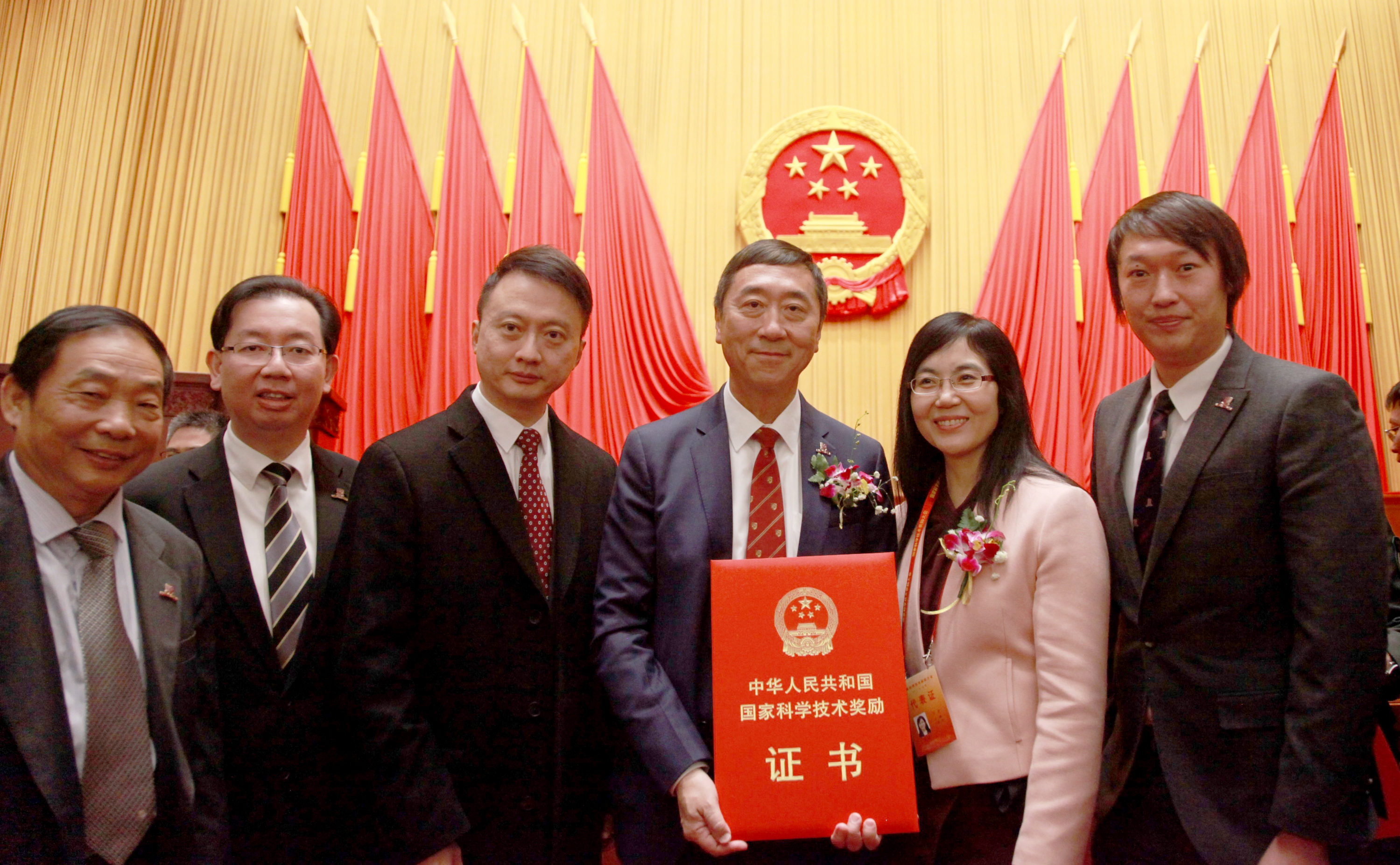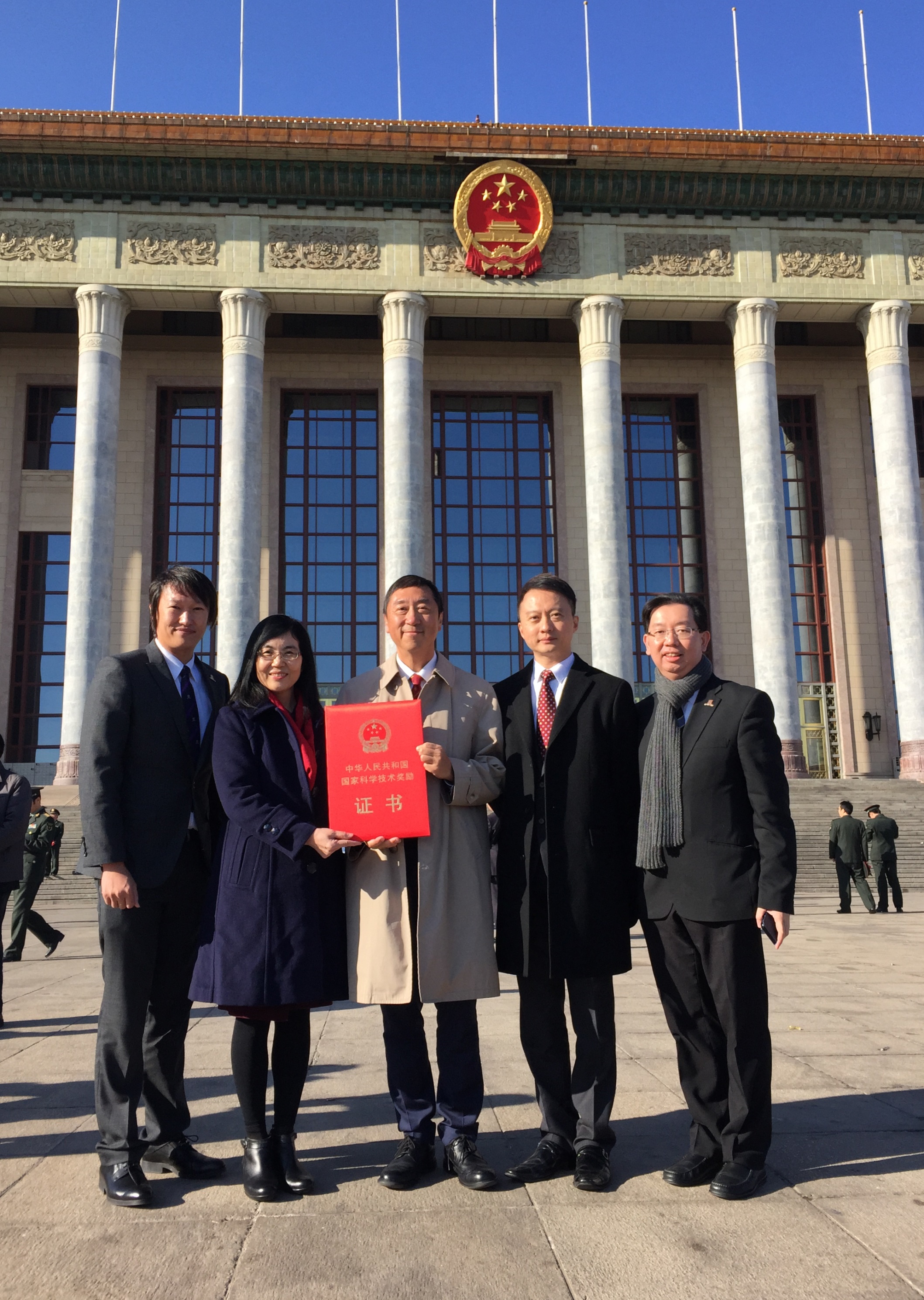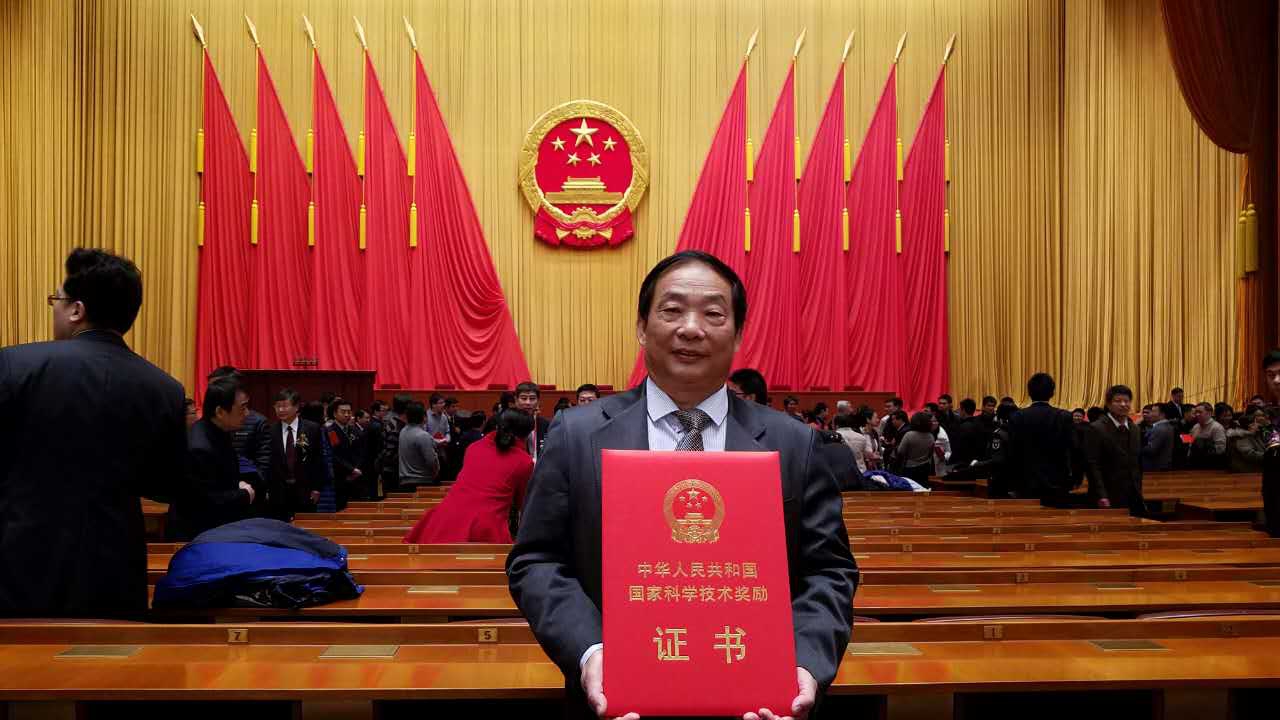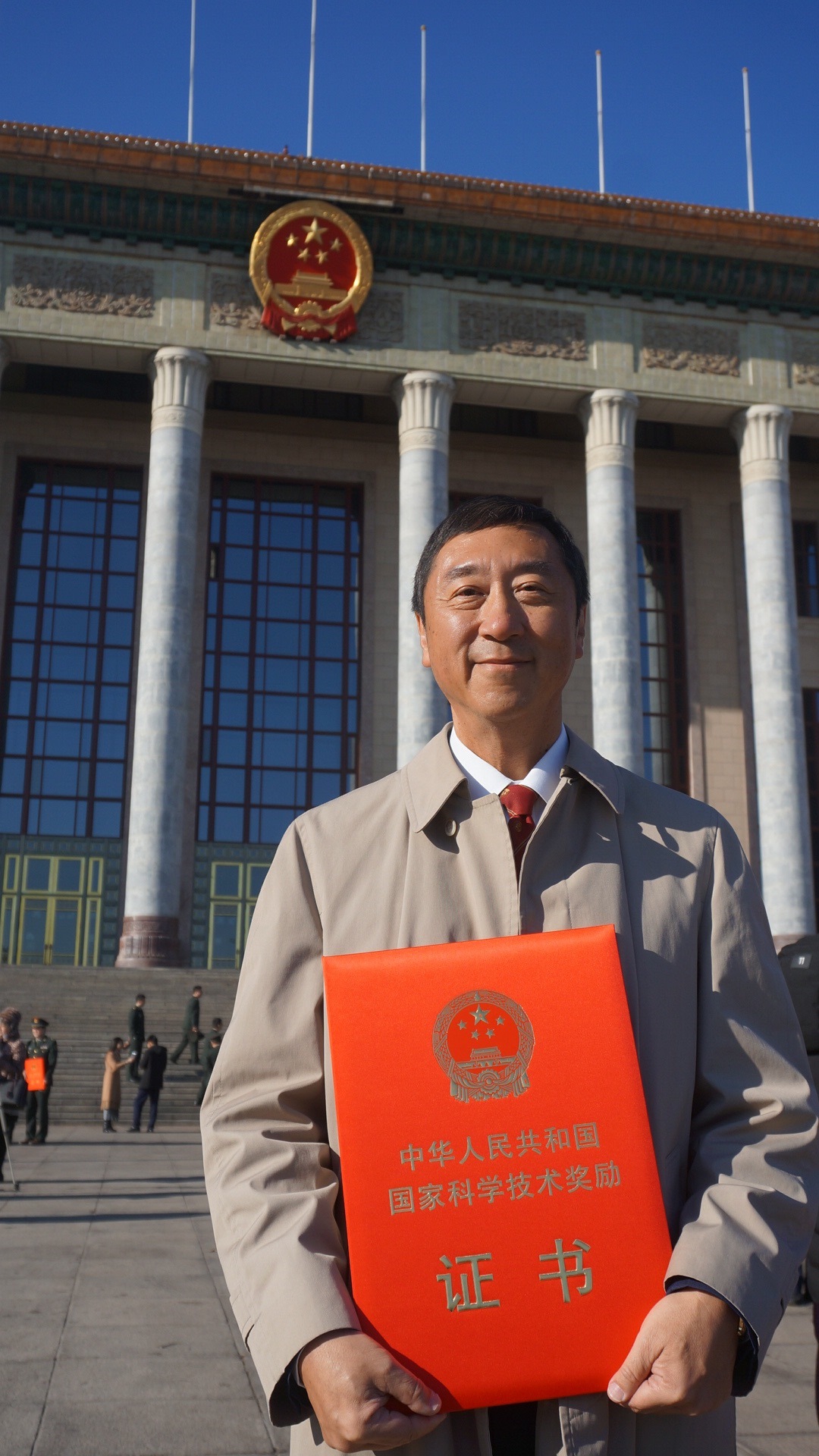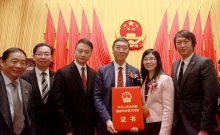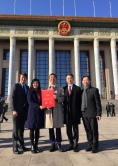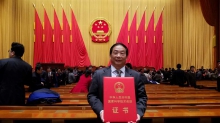CUHK
News Centre
CUHK Researchers Receive Six State Science and Technology Awards
The 2016 State Science and Technology Awards ceremony was held today (9 January) at the Great Hall of the People in Beijing. The Chinese University of Hong Kong (CUHK) received six awards, including one State Natural Science Award (SNSA) second-class, one State Scientific and Technological Progress Award (SSTPA) first-class, three SSTPA second-class awards as well as, for the first time, the SSTPA (Innovation Team).
The State Natural Science Award second-class award – Integrative Research on Molecular Pathogenesis, Diagnostic Biomarkers and Prevention for Colorectal Cancer
Prof. Joseph JY Sung, Vice-Chancellor and President of CUHK and Mok Hing Yiu Professor of Medicine, Prof. Jun Yu, Professor of the Department of Medicine and Therapeutics, Prof. Francis KL Chan, Dean of the Faculty of Medicine, Dr. William KK Wu, Assistant Professor of the Department of Anaesthesia and Intensive Care and the Institute of Digestive Diseases, and Prof. Simon SM Ng, Professor of the Department of Surgery, were honoured with the SNSA second-class award for the project entitled ‘Integrative Research on Molecular Pathogenesis, Diagnostic Biomarkers and Prevention for Colorectal Cancer’.
Colorectal cancer (CRC) is one of the most common malignancies. The research team led by Prof. Joseph JY Sung has been investigating the epidemiology, screening, molecular pathogenesis and biomarkers of CRC for 15 years. The team has achieved several breakthroughs, including leading an Asia-Pacific working group to study the epidemiology and risk factors of CRC and formulating a guideline on CRC screening; unveiling the mutational landscape of CRC in the Chinese population and discovering new fusion genes and high-frequency mutated genes; identifying novel epigenetic alterations and signaling pathway dysregulation in CRC; and identifying novel biomarkers for non-invasive diagnosis of CRC.
The State Scientific and Technological Progress Award (Innovation Team) – Innovation Team on the Study of Digestive Cancers
The Innovation Team on the Study of Digestive Cancers formed by Prof. Joseph JY Sung, Prof. Jun Yu, and Dr Qiaoyi Liang (Research Assistant Professor at the Department of Medicine and Therapeutics) in collaboration with the Fourth Military Medical University (FMMU) was honoured with the SSTPA (Innovation Team). Partnered and working closely with the State Key Laboratory (SKL) of Cancer Biology at FMMU, the establishment of the SKL of Digestive Diseases led by Prof. Joseph JY Sung was approved by the Ministry of Science and Technology of China in 2013. Since then, both sides have undertaken joint SKL meetings annually to promote academic exchange and collaboration. The SSTPA (Innovation Team) was conferred to acknowledge their two decades-long collaborative efforts in the basic and translational research on key molecular changes in digestive cancers.
Digestive cancers are the most common malignancies in China. Through integrating basic science and clinical research, the team has formulated an effective strategy for the prevention, screening and treatment of early-stage gastric cancer, identified novel treatment targets, and developed new methods for minimally-invasive surgery. The team has also been conducting screening for early-stage digestive cancers in high-risk populations.
The State Scientific and Technological Progress Award first-class award – The Research and Application of Combining Traditional Chinese Medicine and Western Medicine for the Treatment of IgA Nephropathy
Prof. Cheuk-chun Szeto from the Division of Nephrology, Department of Medicine and Therapeutics is involved in the project ‘The Research and Application of Combining Traditional Chinese Medicine and Western Medicine for the Treatment of IgA Nephropathy’, which has received the SSTPA first-class award. Immunoglobulin A (IgA) nephropathy is the most common primary glomerulonephritis in the world and is one of the leading causes of end-stage renal disease. In Hong Kong, 12% of dialysis patients have IgA nephropathy. A recent study found that, even before the initiation of dialysis, patients with IgA nephropathy have a higher mortality rate than the normal population. In this project, the main contribution of Professor Szeto is related to the assessment of the natural history of patients with IgA nephropathy who present with isolated microscopic hematuria and minimal proteinuria, their clinical and prognostic features, as well as the feasibility of urinary messenger RNA and microRNA levels as biomarkers for the risk stratification of IgA nephropathy. His contribution provides important scientific evidence for the assessment of therapeutic response to combined traditional Chinese medicine and Western medicine treatment of IgA nephropathy.
The State Scientific and Technological Progress Award second-class award – Exploration and Application of Magnetic Resonance Based Multi-modality Molecular and Functional Imaging
The project entitled ‘Exploration and Application of Magnetic Resonance Based Multi-modality Molecular and Functional Imaging’, of which Prof. Yi–xiang Wang, Associate Professor of the Department of Imaging and Interventional Radiology is a co-investigator, has been honoured with the SSTPA second-class award. This project explored the key technologies of magnetic resonance based multi-modality molecular and functional imaging, and developed molecular probes with high sensitivity, specificity, and stability. Fully utilizing novel biomaterials, novel designs, and novel methods, these molecular probes are able to perform stem cell labelling and in-vivo tracking, and have been applied in tumours and atherosclerosis. Visualized precise treatments are achieved with the combination of diagnostic imaging and targeted medicine. At the same time, the team developed key techniques for functional MR imaging and established a functional imaging big database for researchers to share globally. The team proposed clinical translation protocols for functional imaging, which have been successfully applied in clinical research into multiple brain diseases. The project explored the pathogenesis of related diseases, molecular markers of neuro-imaging and high speed rational predictive models. These researches laid down the foundation for imaging to guide brain disease early treatment with high precision.
The State Scientific and Technological Progress Award second-class award – Mechanisms, Prevention and Treatment for Progressive Chronic Kidney Disease
Prof. Hui-yao Lan, Assistant Dean of the Faculty of Medicine (Research), Choh-Ming Li Professor of Biomedical Sciences, won the SSTPA second-class award on ‘Mechanisms, Prevention, and Treatment for Progressive Chronic Kidney Disease’. This is a joint research award with several universities in Mainland China by studying the new molecular and genetic mechanisms and developing new therapeutic strategies for chronic kidney disease. Professor Lan’s research team found that TGF-beta/Smad signalling proteins are key factors that cause renal fibrosis. Among these signalling proteins, Smad3 is pathogenic while Smad2 and Smad7 are protective. During renal fibrosis Smad3 is highly activated but Smad7 is lost. Smad3 mediates renal fibrosis by upregulating and downregulating some key microRNAs (miRNAs) and long-chain non-coding RNAs (lncRNAs). The research team also developed Traditional Chinese Medicine and an ultrasound microbubble gene therapy technology to specifically target these genes for renal fibrosis by rebalancing the TGF-beta/Smad signalling or Smad3-dependent miRNAs or lncRNAs. These important findings have been confirmed in a number of animal models of chronic kidney disease and provide the scientific evidence for treatment of chronic kidney disease clinically.
The State Scientific and Technological Progress Award second-class award – Investigation of the Pathogenicity of Retinal Disease Genes and Promotion of Its Application in Disease Treatment and Prevention
The ‘Investigation of the Pathogenicity of Retinal Disease Genes and Promotion of Its Application in Disease Treatment and Prevention’ project led by Prof. Chi Pui Pang, S.H. Ho Professor of Visual Sciences and Professor of Ophthalmology and Visual Sciences, and collaborators, has been awarded the SSTPA second-class award. The project addresses two major categories of retinal diseases; age-related macular degeneration (AMD) and paediatric retinal diseases (PRD). The research group identified new disease genes and elucidated their roles in the disease pathogeneses, and established the genetic diagnosis and prevention platform for retinal diseases. The key accomplishments included: 1) Identification of the major genes for AMD. The group identified HTRA1 as the most important gene for AMD in the Chinese population, and unravelled its role in AMD mechanism, providing new insights into the therapy of AMD. This finding was listed as one of the top-10 scientific breakthroughs of 2006 by Science. 2) Establishment of AMD genetic risk prediction and disease treatment and prevention system for the Chinese population, reducing the occurrence of AMD and improving the therapeutic efficacy. 3) Establishment of a big-data analysis platform and identification of new disease-causing genes for PRD, expanding the spectra of retinal disease genes and mutations. 4) Development of the PRD diagnostic gene chip, enabling precise diagnosis of PRD and providing therapeutic guidance. 5) Leading the PRD prenatal diagnosis and genetic consultation. Traditional screening of birth defect does not provide prenatal diagnosis of PRD. The group has developed a novel diagnostic gene chip for PRD and provided prenatal diagnosis service for over 70,000 individuals from 13 ophthalmic centres in 10 provinces and cities of mainland China.
The winning team of SNSA 2-class award (from left): Prof William KK Wu, Research Assistant Professor of the Department of Anaesthesia and Intensive Care and the Institute of Digestive Diseases; Prof. Jun Yu, Professor of the Department of Medicine and Therapeutics; Prof. Joseph JY Sung, Vice-Chancellor and President of CUHK and Mok Hing Yiu Professor of Medicine; Prof. Francis KL Chan, Dean of the Faculty of Medicine; and Prof. Simon SM Ng, Professor of the Department of Surgery.
Prof. Hui-yao Lan, Assistant Dean of the Faculty of Medicine (Research), Choh-Ming Li Professor of Biomedical Sciences, receives the SSTPA 2-class award.


